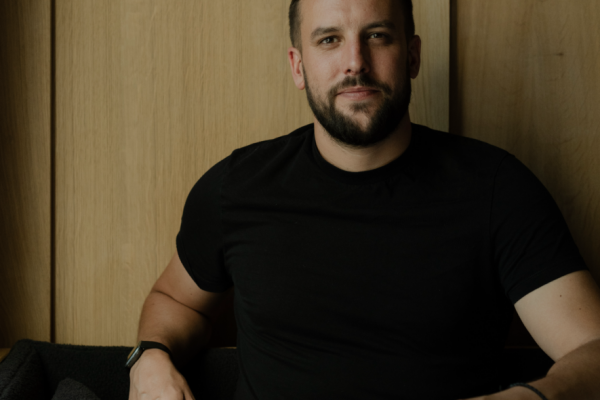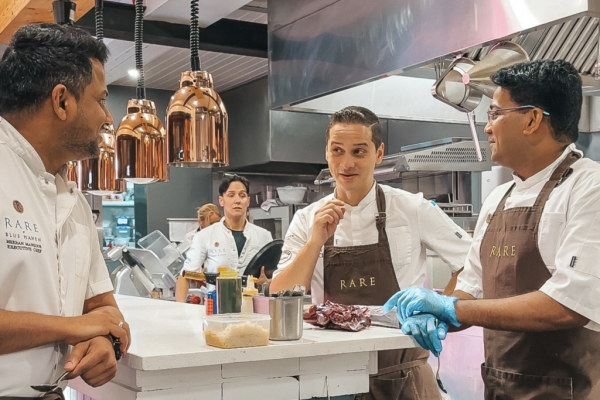Restaurant Cycene was founded by chef Theo Clench in collaboration with James and Christie Brown, founders of Blue Mountain School, and it is known as somewhere where art, design and gastronomy meet. Clench talks to Hospitality Ireland about the bonding role of food in his childhood and the challenges of continuous innovation.
This article was originally published in the Spring 2024 issue of Hospitality Ireland Magazine, in February of 2024.
An extension of Blue Mountain School, Cycle's approach to gastronomy stems from its unique relationship with art. Chef Clench’s menu bases itself on hyper- seasonal produce and focuses on fish and seafood, wherein influences from Eastern Asia, Australia and Europe can be traced. He and his team are advocates of fermentation, curing and ageing techniques, which are found as bases in dishes and sauces across the menu, as well as in the restaurant’s soft- drink pairing, which serves as an alternative to its premium wine offering.
Dinner at Cycene is interactive and served in three stages and locations across the restaurant, starting with a ‘broth ritual’ at the bar, followed by canapés and a welcome from the chefs in the kitchen, which then leads to being seated in a cosy dining room, surrounded by carefully curated art and design pieces.
Tell us about background - where you grew up, studied, etc.
Growing up in Brighton, food was always something that brought my family together. We didn’t go out and eat a lot, but it was important that everyone was home in the evening, so we’d sit and have a family dinner. At 14, as I was figuring out what I wanted to do professionally, I got a job as a kitchen porter, and from that point onwards, I never left the world of hospitality. I worked at various local gastropubs and rose through the ranks, before moving to pursue a career as a chef in London.
What formative moments can you remember that decided your career path?
After working in gastropubs near Brighton, I moved to London, aged 22, and took up a position at the Stafford Hotel. I quickly realised the hotel environment wasn’t for me, so I made a move back to the kitchens and worked under Adam Byatt at Trinity, where I spent nearly two years.
That was the kitchen that really made me. The techniques I learnt there were rooted in honest, classic cookery – no water baths, and everything was cooked in a pan. It was old school. I then moved on to Bonhams, by chef Tom Kemble, which was an equally pivotal time for me. Working with him taught me the importance of provenance and the quality of produce. These principles heavily influence my cooking style at Cycene today.
When did you first realise that you wanted to do this professionally?
I’ve always loved cooking for the way it made people happy. When cooking, you have the opportunity to explore your creativity endlessly and surprise your guests – and sometimes yourself – with the combination of flavours you use. Cooking is all about crafting a memorable experience for the person you’re cooking for. When I first set foot in a professional kitchen, I got to experience cooking more intensely, but it felt amazing. As I learnt the skills and techniques, I found myself feeling more and more passionate to know and do more in the kitchen. I knew then, this was my calling.
What was your first big role?
When I took over the head chef position at Bonhams restaurant.
What was that like? What did you learn?
It was exciting, but also daunting. There was a lot of responsibility that came with the role, and I wanted to prove myself, both as a chef and a leader. I learned to trust myself and my process, to be creative in what I do, but also to be methodical. A good chef doesn’t lose his head, and there is a lot of discipline involved in reaching that level.
How did Cycene come about?
Cycene is the result of a shared creative vision with James and Christie Brown – also the founders of Blue Mountain School, which the restaurant forms the culinary arm of. In addition to the restaurant, the six-storey building plays host to a clothing archive, listening room, and exhibition space showcasing art, furniture, design and ceramics. Cycene is the culinary extension of their philosophy.
True to the ethos of Blue Mountain School, Cycene aims to challenge the boundaries of a traditional dining experience through authentic and meaningful collaboration. It’s a fully immersive environment that brings together music, architecture, atmosphere and art to create a 360- degree sensory journey.
Tell us about Cycene – what it means, the ethos, food, service, etc.
Cycene is Old English for kitchen, and it’s a nod to our open kitchen, showcasing every element – from food prep, fermentation, an ageing room, and, of course, the cooking. James and Christie are visionaries, and Cycene is a testament to their creative discipline.
A visit to Cycene is like dining in someone’s private home. The movement through the dining experience also contributes to making it special. The evening starts on the ground floor, before guests are led to the first-floor kitchen and the candlelit dining room, which is currently decorated with an artwork by Frank Auerbach.
What makes a great restaurant?
The ability to have every guest fully immersed in the ambiance you’ve crafted for them. Restaurants are magical places and offer an opportunity to lose oneself for the evening, especially in a city like London and the times we live in. We want our guests to leave whirling with joy and fulfilment. An incredible meal is marked by the sensory impact that the restaurant, atmosphere and food have on its guests – the same way art and music also bring that – and I believe it is what makes a restaurant truly memorable.
How have your travels fed into what you do at Cycene?
I have travelled across East Asia and Australia, and the food at Cycene reflects some of the flavours and approaches I have encountered during my travels. I love herbs and their ability to impart subtle but effective flavours to the dish that tie everything together. For example, in a recent pre-dessert, I used a Japanese shiso leaf with a green-apple sorbet as an herb-forward palate cleanser, and in another dish, I used kinome or sansho leaf, which has a wonderful minty flavour. I also love using seafood at Cycene, and Japanese fish prep and presentation play a big role in my dishes.
Do you still find time to travel and seek new influences?
Much of my time is spent in the kitchen at Cycene, but I try to find the time to travel and explore whenever I can. New influences don’t have to always come from abroad, though. London is such a melting pot of cultures that I am able to explore different cuisines without even leaving the city. There is something for everyone here. The UK, in general, has some incredible restaurants and chefs who are really pushing boundaries. Travelling across the country is inspirational for me, and I’d like to do more of that in the near future.
What are the changing trends in hospitality – people’s expectations, new elements, etc.?
There is a trend towards more sustainable ingredients and kitchen practices – towards eating seasonally and locally. At Cycene, we get 95% of our produce from the British Isles, and I maintain personal links with our suppliers because that is how you get great ingredients.
Our menu changes gradually, to reflect the changes of the seasons, and this is a welcome challenge that we love exploring in the kitchen. Another trend is that diners have become a lot more discerning and particular about what they want from their experience. After the pandemic, we have learnt to treasure our experiences, and now, when we go out, we are looking for something with personality, something to really remember. It’s rewarding to be held accountable and to continue refining our experience at Cycene.
What are the major challenges at the moment?
On a more abstract level, one of the current challenges is continuing to surprise and innovate. London has a world-class dining scene, with a wealth of fantastic options and chefs doing some very interesting things in the kitchen. At Cycene, we are always challenging ourselves to go further with our menus and the experience we deliver. We want our guests to feel like this is a one-of-a- kind experience, and that means constantly perfecting what we do.
What are the main opportunities?
There is progress with more sustainable kitchen practices and the avenues this opens for us to explore as chefs. We are learning to think differently about what and how we cook, and this leads to creative problem-solving in the kitchen, as well as many happy accidents. We are big on fermenting and dry-ageing at Cycene, and constantly experiment with how we can manipulate ingredients. Our soft-drink pairings are a great example of this, combining a growing trend towards lower alcohol consumption with our fermentation programme. We are constantly innovating and finding new ways of presenting familiar ingredients..








